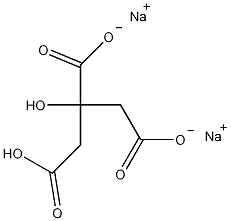
Structural formula
| Business number | 03WF |
|---|---|
| Molecular formula | C6H6Na2O7 |
| Molecular weight | 236.09 |
| label |
disodium citrate, Sodium citrate, disodium citrate, 2,3-Propanetricarboxylic acid, 2-Hydroxy-disodium salt |
Numbering system
CAS number:144-33-2
MDL number:None
EINECS number:205-623-3
RTECS number:GE7580000
BRN number:None
PubChem ID:None
Physical property data
1. Physical property data:
1. Character:Colorless to white crystal or crystalline powder
2. Melting point (ºC): 240ºC
-bidi-font-family: Tahoma”>3. Solubility:Easily soluble in water (50g/100ml, 25℃).
Toxicological data
2. Toxicological data:
1, acute toxicity: rat abdominal cavity LD50: 1724 mg/kg;
Mouse abdominal cavity LD50: 1771 mg/kg;
Mouse subcutaneous LD50: 2580 mg/kg;
Mouse intravenous LD50: 71 mg/kg;
Rabbit intravenous LD50: 418 mg/kg.
Ecological data
3. Ecological data:
Usually for Water is not hazardous and materials should not be discharged into the surrounding environment without government permission.
Molecular structure data
None
Compute chemical data
1. Reference value for hydrophobic parameter calculation (XlogP): None
2. Number of hydrogen bond donors: 2
3. Number of hydrogen bond acceptors: 7
4. Number of rotatable chemical bonds: 3
5. Number of tautomers: none
6. Topological molecule polar surface area 138
7. Number of heavy atoms: 15
8. Surface charge: 0
9. Complexity: 216
10. Number of isotope atoms: 0
11. Determine the number of atomic stereocenters: 0
12. Uncertain number of atomic stereocenters: 0
13. Determine the number of chemical bond stereocenters: 0
14. Number of uncertain chemical bond stereocenters: 0
15. Number of covalent bond units: 3
Properties and stability
Stable under normal temperature and pressure.
Storage method
Save in a dry and cool place.
Synthesis method
It is obtained by reacting sodium carbonate with a calculated amount of citric acid.
Purpose
Antioxidant; antioxidant synergist; buffer; emulsifying salt. EEC Approved for wine, sparkling wine and cheese slices.
soNormal style=”MARGIN: 0cm 0cm 0pt; TEXT-ALIGN: left; mso-margin-top-alt: auto; mso-margin-bottom-alt: auto; mso-pagination: widow-orphan” align=left>Obtained from the reaction of sodium carbonate and a calculated amount of citric acid.
Purpose
Antioxidant; antioxidant synergist; buffer; emulsifying salt. EEC Approved for wine, sparkling wine and cheese slices.

 微信扫一扫打赏
微信扫一扫打赏

